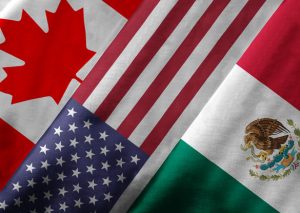This Morning in Metals: USMCA Signed at G20; Metals Tariffs on Canada, Mexico Remain
This morning in metals news, the U.S., Canada and Mexico formally signed the trade deal that will serve as the successor to the North American Free Trade Agreement (NAFTA), aluminum associations in several countries sent Group of 20 (G20) leaders a joint letter asking them to tackle overcapacity, and President Donald Trump and President Xi Jinping are set to meet this weekend at the G20 summit in Argentina.
Need buying strategies for steel? Request your two-month free trial of MetalMiner’s Outlook
U.S., Canada, Mexico Sign UMSCA
After a Sept. 30 announcement that the U.S., Canada and Mexico had concluded talks on the trade deal —dubbed the United States-Mexico-Canada Agreement (USMCA) — set to replace NAFTA, the parties involved made it official this morning.
Trump, Canadian Prime Minister Justin Trudeau and Mexican President Enrique Peña Nieto, on his last day in office, signed the trade deal this morning during the G20 summit in Buenos Aires, Argentina.
However, despite the signing, dialogue over trade among the three countries is not yet at an end. Mexican and Canadian leaders have indicated they will continue to push for the U.S. to remove its Section 232 steel and aluminum tariffs on the two countries’ metals.
The first round of talks focusing on renegotiation and modernization of NAFTA kicked off in August 2017. The U.S. initially pushed for a resolution by the end of 2017, but the negotiations continued into the new year. Elections in the three countries — including Mexico’s July 1 presidential election — came and went without a deal.
Among the key topics of negotiation were automotive content rules of origin and wages for Mexican workers — in the USMCA, the regional content benchmark jumps to 75% from 62.5%, while also requiring that 40-45% of auto content be produced by workers making at least $16 per hour.
The country’s leaders delivered comments at the USMCA signing ceremony in Buenos Aires, with Trump calling the NAFTA successor the “largest, most significant, modern, and balanced trade agreement in history.”
“All of our countries will benefit greatly,” Trump said. “It is probably the largest trade deal ever made, also. In the United States, the new trade pact will support high-paying manufacturing jobs and promote greater access for American exports across the range of sectors, including our farming, manufacturing, and service industries.”
Trudeau, meanwhile, said the new deal “maintains stability” for Canada’s economy and praised the negotiating teams involved, but was less effusive in his praise of the USMCA than Trump and Peña Nieto.
The Canadian prime minister also reiterated sentiment regarding the removal of the U.S.’s steel and aluminum tariffs.
“As I discussed with President Trump a few days ago, the recent plant closures by General Motors, which affects thousands of Canadian and American workers and their families, are a heavy blow,” he said. “Make no mistake: We will stand up for our workers and fight for their families and their communities.
“And, Donald, it’s all the more reason why we need to keep working to remove the tariffs on steel and aluminum between our countries.”
In addition, Chapter 22 of the USMCA includes provisions on state-owned enterprises (SOEs).
“We have dramatically raised standards for combatting unfair trade practices; confronting massive subsidies for state-owned enterprises; and, currently, if you look at it, currency manipulation that hurt workers in all three of our countries,” Trump said. “The currency manipulation from some countries is so intense, so bad, and it would hurt Mexico, Canada, and the United States badly.”
Aluminum Associations Want Focus on Overcapacity
Aluminum associations from several countries sent a joint letter to G20 leaders asking them to commit to addressing global overcapacity.
“We urge the G20 to again commit to tackling the issue of market-distorting aluminium overcapacity that stems from state interference and puts aluminium producers across the entire value chain at a profound disadvantage,” the letter said. “Free trade is an engine of prosperity, social mobility and peace – but free trade is only possible and meaningful when businesses are able to operate on an equal footing across the globe.”
The letter was signed by the heads of the aluminum associations in the U.S., Europe, Brazil, Japan, Canada and Mexico.
Trump, Xi Meeting Could Be U.S.-China Trade Flashpoint
Sticking with the G20 summit in Argentina, President Trump and President Xi are set to meet at the event, which will continue through tomorrow, Dec. 1.
The U.S. imposed tariffs, at a 10% rate, on $200 billion worth of Chinese goods in September. However, that rate is set to make a sizable jump to 25% as of Jan. 1. The U.S. had previously imposed a total $50 billion in tariffs on Chinese goods.
MetalMiner’s Annual Outlook provides 2019 buying strategies for carbon steel
Trump has also threatened to impose tariffs on all remaining Chinese imports — approximately $257 billion worth — although no moves have been made yet on that front.



Leave a Reply